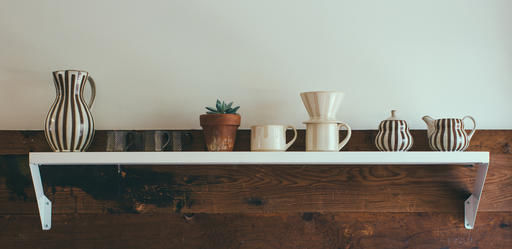Ceramic artists ride design's trend toward the handcrafted
People live more casually now, and there’s been less of a need for formal china settings.

Lisa Jones founded her ceramics company, Pigeon Toe, eight years ago with an emphasis on petite pottery pieces like her three-legged “tripot” bowls and teensy stacking bowls.
Her timing could not have been better, she says.
“I rode the wave of a resurgence in handcrafts and the individual maker,” says Jones, 32, of Portland, Ore.
Artistic, accessible and affordable, small-scale handcrafted ceramics can appeal to young singles decorating first-time apartments, or to older folks and families looking for a more personalized look than mass-produced items provide.
“We have our entry-price customers, and aspirational pieces reaching a demographic of people with means to spend,” says Jones. Pigeon Toe’s best-seller is the 3-inch-high, $48 tripot. It has an unglazed, white porcelain exterior, and a glazed interior in a choice of 16 colors.
“In the past five years, smaller ceramics have grown so much in popularity,” says Eugenia Santiesteban Soto, senior style editor at Better Homes and Gardens magazine. “They’re functional, but they’re also pieces of art. People are tapping into the notion of owning something beautiful and imperfect, but that you can use in your everyday life. You can tell there’s a hand that made it. It feels very soulful, authentic.”
Besides the evergreen appeal of mugs, Soto notes the functional allure of cups and vessels that can hold everything from food and drink to flowers, pencils and cotton swabs.
Mociun, a Brooklyn, New York-based jewelry and home goods store, sells mugs, cups, tumblers, pitchers, vases, bowls and plates by dozens of artists from across the country. Prices range from $24 for a speckled tumbler to $446 for a set of five metallic nesting bowls. Mugs sell the best, said company founder Caitlin Mociun.
“I have watched artists grow in their careers, starting as a hobby and now creating full collections of pieces sold in several stores,” she says. “A lot of our customer traffic at the store is walk-ins or tourists. They are looking for gifts or take-away items, which small-scale pieces are great for.”
Jeremy Ayers is a ceramics artist in Waterbury, Vt., whose modern rustic pieces — from a $55 round salt box to a pair of bulbous, aqua-colored mugs — are carried by stores (including Mociun) and his own online and studio shops. His studio is in the 1870 carriage barn where his great-great-grandfather made wheels and carriages.
“I’ve been noticing more customers on the younger end who want to add to their home aesthetic,” says Ayers, 41. “Maybe because so many young people work in an office cubicle, having my mug in their cubicle is a breath of fresh air.”
With pottery, repetition is part of the process. Ayers usually produces his salt boxes in batches of 20.

 沪公网安备31010402003309号
沪公网安备31010402003309号



